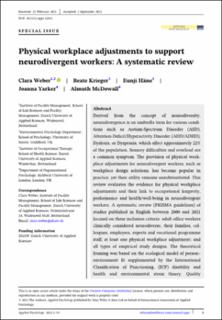Bitte benutzen Sie diese Kennung, um auf die Ressource zu verweisen:
https://doi.org/10.21256/zhaw-25612| Publikationstyp: | Beitrag in wissenschaftlicher Zeitschrift |
| Art der Begutachtung: | Peer review (Publikation) |
| Titel: | Physical workplace adjustments to support neurodivergent workers : a systematic review |
| Autor/-in: | Weber, Clara Krieger, Beate Häne, Eunji Yarker, Joanna McDowall, Almuth |
| et. al: | No |
| DOI: | 10.1111/apps.12431 10.21256/zhaw-25612 |
| Erschienen in: | Applied Psychology: An International Review |
| Erscheinungsdatum: | 2022 |
| Verlag / Hrsg. Institution: | Wiley |
| ISSN: | 0269-994X 1464-0597 |
| Sprache: | Englisch |
| Schlagwörter: | Systematic review; Performance; Well-being; Neurodiversity; Neurodivergence; Workplace adjustment; Occupational longevity |
| Fachgebiet (DDC): | 331: Arbeitsökonomie 616.8: Neurologie und Krankheiten des Nervensystems |
| Zusammenfassung: | Background: Derived from the concept of neurodiversity, neurodivergence is an umbrella term for various conditions such as Autism-Spectrum Disorder (ASD), Attention-deficit/hyperactivity Disorder (ADD/ADHD), Dyslexia or Dyspraxia which affect approximately 22% of the population. Sensory difficulties and overload are a common symptom. The provision of physical workplace adjustments for neurodivergent workers, such as workplace design solutions, have become popular in practice, yet their utility remains unsubstantiated. Purpose: This review evaluates the evidence for physical workplace adjustments and their link to occupational longevity, performance, and health/well-being in neurodivergent workers. Method: A systematic review (PRISMA guidelines) of studies published in English between 2000 and 2021 focused on these inclusion criteria: adult office workers clinically considered neurodiverse, their families, colleagues, employers, experts, and vocational program staff; at least one physical workplace adjustment; all types of empirical study designs. The theoretical framing was based on the ecological model of Person-Environment fit supplemented by the International Classification of Functioning, (ICF) Disability and Health and environmental stress theory. Quality assessment and data synthesis were undertaken. Results: Of the 319 studies identified, 20 met the eligibility criteria; the majority addressed ASD. Most studies described a combination of adjustments to address different environmental stimuli. The most frequent adjustments addressed sound distractions (e.g. single-person offices) and light sensitivity (e.g. light control), which were related to occupational longevity, performance and health/well-being. A range of other adjustments addressed aspects such as environmental control, crowding, or decompression rooms. There is insufficient evidence to fully evaluate the usefulness of adjustments, partially due to methodological shortcomings. Conclusions: Despite the variety of challenges with the sensory physical environment acknowledged in the literature for neurodivergent conditions, there is a paucity of evidence. Given the potential of physical adjustments to improve work and health outcomes, we highlight the necessity for more theoretically driven and methodologically sound research. |
| Weitere Angaben: | Video Summary: https://youtu.be/j_l15bcEtjk |
| URI: | https://digitalcollection.zhaw.ch/handle/11475/25612 |
| Volltext Version: | Publizierte Version |
| Lizenz (gemäss Verlagsvertrag): | CC BY 4.0: Namensnennung 4.0 International |
| Departement: | Gesundheit Life Sciences und Facility Management |
| Organisationseinheit: | Institut für Ergotherapie (IER) Institut für Facility Management (IFM) |
| Publiziert im Rahmen des ZHAW-Projekts: | Care for Rare - Towards Inclusive Work Environments for Neurodiverse Workers |
| Enthalten in den Sammlungen: | Publikationen Life Sciences und Facility Management |
Dateien zu dieser Ressource:
| Datei | Beschreibung | Größe | Format | |
|---|---|---|---|---|
| 2022_ Weber-etal_Physical-workplace-adjustments-support-neurodivergent-workers-systematic-review.pdf | 835.79 kB | Adobe PDF |  Öffnen/Anzeigen |
Zur Langanzeige
Weber, C., Krieger, B., Häne, E., Yarker, J., & McDowall, A. (2022). Physical workplace adjustments to support neurodivergent workers : a systematic review. Applied Psychology: An International Review. https://doi.org/10.1111/apps.12431
Weber, C. et al. (2022) ‘Physical workplace adjustments to support neurodivergent workers : a systematic review’, Applied Psychology: An International Review [Preprint]. Available at: https://doi.org/10.1111/apps.12431.
C. Weber, B. Krieger, E. Häne, J. Yarker, and A. McDowall, “Physical workplace adjustments to support neurodivergent workers : a systematic review,” Applied Psychology: An International Review, 2022, doi: 10.1111/apps.12431.
WEBER, Clara, Beate KRIEGER, Eunji HÄNE, Joanna YARKER und Almuth MCDOWALL, 2022. Physical workplace adjustments to support neurodivergent workers : a systematic review. Applied Psychology: An International Review. 2022. DOI 10.1111/apps.12431
Weber, Clara, Beate Krieger, Eunji Häne, Joanna Yarker, and Almuth McDowall. 2022. “Physical Workplace Adjustments to Support Neurodivergent Workers : A Systematic Review.” Applied Psychology: An International Review. https://doi.org/10.1111/apps.12431.
Weber, Clara, et al. “Physical Workplace Adjustments to Support Neurodivergent Workers : A Systematic Review.” Applied Psychology: An International Review, 2022, https://doi.org/10.1111/apps.12431.
Alle Ressourcen in diesem Repository sind urheberrechtlich geschützt, soweit nicht anderweitig angezeigt.